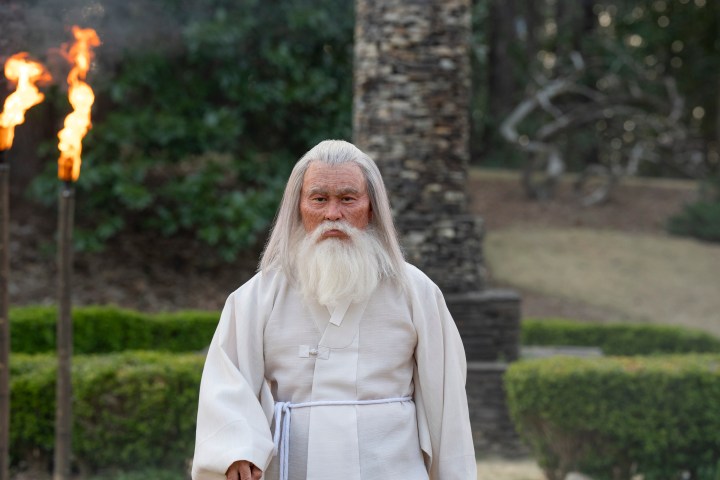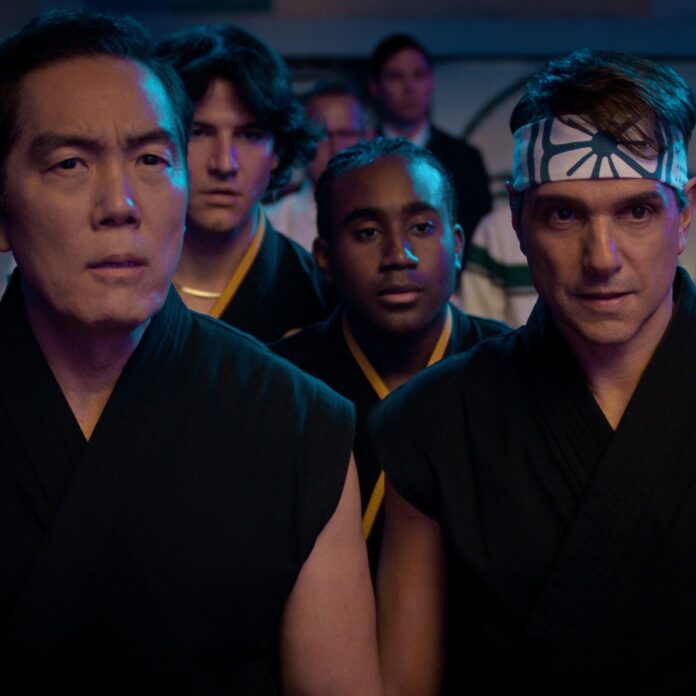Nearly seven years after its debut, Cobra Kai has come to an end. The third and final batch of episodes from its sixth and final season dropped on Netflix last Friday, bringing with it some of the best writing and acting to come out of the entire series, all the while wrapping up loose ends. Did any of it have to do with the show’s dodgy efforts at Asian and Asian American representation? Not at all!
I’ll be the first to admit that I’ve been harpooning pretty hard on a show that has been doing what otherwise has been happening to a lot of established IPs in recent years — revitalize it, regardless of whether or not anyone asked for it — except that they’ve done it better. They took characters, both prominent and minor, from across the films, and weaved them in almost effortlessly throughout the series, built upon what was already established, and especially for the prominent characters, made them more than one dimensional.
In that same breath, the showrunners seem to struggle at doing just that for really any character, whether already established or introduced in this series, that were Asian; which is really sad, especially considering how few of them there were.
In these last batch of episodes, contrary to the previous batch, there actually wasn’t really much to poke at. We see All-Valley Tournament committee member, George (Kurt Yue), return for the first time in who knows how many seasons. Kim Da-Eun (Alicia Hannah-Kim) killed her grandfather… and then just kind of hung out for the rest of the season until reuniting with Chozen (Yuji Okumoto) (yay?). The arch revolving around Mr. Miyagi’s questionable past was barely wrapped without so much as a quick nugget of wisdom, delivered by the even more horrific-looking AI Miyagi than the last time.

Cobra Kai arrived on the scene at a particularly poignant time, both culturally and personally. It premiered on YouTube Red mere months before Crazy Rich Asians forever changed the trajectory of Asian American representation in mainstream media. On my end, it arrived not long after I had conducted a series of interviews for YOMYOMF with the family and former co-workers of Pat Morita (who played Mr. Miygai), about a project he worked on post-Karate Kid.
As a result of both occurrences, I had expected for the effects of the changing media landscape to trickle down to the series that’s heavily revolved around an Asian martial art, and for Morita’s memory to be honored.
Looking back on my previous critiques on the Asian representation of Cobra Kai, it’s interesting how some of what I suggested and had hoped for came true, although not always in the ways I had expected. Following the second season, I had suggested that Tamlyn Tomita and Okumoto should reprise their roles as Kumiko and Chozen from The Karate Kid Part II, and they did. In fact, Okumoto in particular was given a lot to work with in the later seasons. Following the third season, I had suggested for maybe one day having Mr. Miyagi’s backstory be explored. That wound up happening in this final season, although not at all in the way I had suggested, and in a way that I didn’t find to be warranted either.

The fifth season saw the most amount of Asian characters to date, but for the most part, it wasn’t without relying on blatantly old stereotypes. And who could forget how the most questionable character decisions were made with Part 2 of this final season. I’m still disgusted by the choice to use AI, just to bring back Mr. Miyagi.
So now that Cobra Kai has come to an end, what have we learned? Going back to earlier, I again applaud how the show creators Josh Heald, Jon Hurwitz, and Hayden Schlossberg actually produced a well crafted continuation of a beloved IP, and the fact that they were already super fans helps a great deal. That being said, if they do pursue any sort of continuation within the franchise in the foreseeable future, then they’ve got to get a grip on the time we’re in now and retire the old tactics used to portray Asian characters they — as three white guys — grew up seeing in the ‘80s. We are halfway through the third decade of the 21st century, and Asian Americans are making it clear that we are here, always have been, and are not going anywhere.
That’s why I’m very much looking forward to when Karate Kid: Legends comes out in a few months. The trailer alone is so enticing. It’s way more tonally reminiscent of the films, several of the leads are Asian and Asian American (including the new kid!), and it’ll be interesting to see two distinct Asian martial arts being brought together.
Cobra Kai has left its mark on modern day pop culture, but definitely not in the department of Asian representation. If you can look past that — as commonly recurring as its shortfalls are — then I think Cobra Kai can make for a good time.

